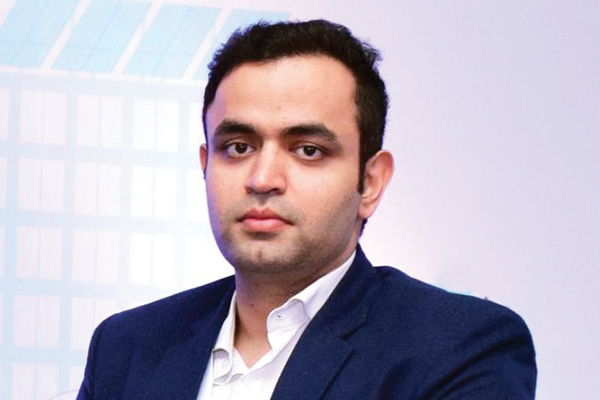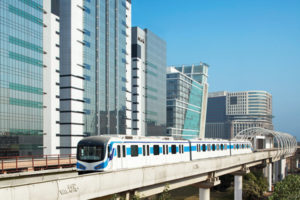
To ensure planned development, proper waste management and transportation are the two key components. In an exclusive interaction, Gaurav Antil, Joint Commissioner, Municipal Corporation of Gurugram, shares strategies of the Municipal Corporation for improved waste management and transportation to Gautam Debroy of Elets News Network (ENN).
Tell us something about the waste management process of Gurugram.
A concession agreement has been signed between the Government of Haryana, Municipal Corporation of Gurugram and Municipal Corporation of Faridabad. The agreement was signed in the presence of our Chief Minister Sheri Manohar Lal on 14 August 2017. Under the agreement, M/S Ecogreen energy Gurugram Faridabad Pvt Ltd, a subsidiary of a Chinese company is working for us. They are into solid waste management. The solid waste management is done in four stages.

In the first stage, door-to-door garbage collection is done by the company. Separate containers for bio-degradable and non-biodegradable waste. Green containers for wet waste and blue containers for dry waste.
In the second stage, the collected waste is taken to a secondary collection point in closed motorised vehicles. The collection points are in the form of underground and on-ground bins with different capacities. The minimum capacity of a bin is 500 kg. Around 400 bins will be placed in four zones of Municipal Corporation Gurugram.

In the third stage, the garbage from these bins is taken to the transfer stations. Every zone has one transfer station. At these transfer stations, the waste is compacted and transferred for final processing. In the last stage, the waste is transferred to processing units for creating electricity or to a landfill site. The current landfill site is spread across 2.7 acres. At the landfill site, the waste is converted into compost.
 “Like other metropolitan cities, transportation is one of the major challenges in the Gurugram. To resolve this issue, we have planned an intra-city bus service. For this, we have formed Gurugram Metropolitan City Bus Limited.”
“Like other metropolitan cities, transportation is one of the major challenges in the Gurugram. To resolve this issue, we have planned an intra-city bus service. For this, we have formed Gurugram Metropolitan City Bus Limited.”
You have initiated cluster-based approach for solid waste management in Haryana and especially in Gurugram. Tell us something on that.
Haryana’s urban population is approximately 88 lakh as per census 2011. This is 34.88 percent of total population of Haryana. The current waste generation in Haryana is about 4265 tons per day which is likely to be increased to 7500 tons per day by 2035. We have 80 Urban Local Bodies (ULBs) grouped into 15 clusters. And the clusters formed based on parameters such as existing treatment plant, optimal transport distance and waste projections. The cluster-based project will be developed on Develop, Built, Finance, Operate & Transfer (DBFOT) model in PPP mode. The private developers have also been selected through an open competitive bidding process. The total population of cluster is around 23 lakhs as per 2011 census. And Gurugram has 8.86 lakhs and Faridabad has 14.14 lakhs.
To resolve the traffic problem of the city, what measures have been taken?
Like other metropolitan cities, transportation is one of the major challenges in the Gurugram. To resolve this issue, we have planned an intracity bus service. For this, we have formed Gurugram Metropolitan City Bus Limited. To operationalise the project, we have signed a MoU with Delhi Integrated Multi-Modal Transit System Ltd. Following the MoU, we have chalked out a comprehensive mobility plan under which the routes for various buses and locations of the bus stops will be decided. Other components are the construction of bus depots and hiring of the concessionaire for the bus service. For the city bus service, we have adopted a Gross Cost Model. In this model, the complete cost of buying and maintaining the buses is born by the concessionaire.
“The cluster-based project will be developed on Develop, Built, Finance, Operate & Transfer (DBFOT) model in PPP  mode. The private developers have also been selected through an open competitive bidding process.”
mode. The private developers have also been selected through an open competitive bidding process.”
How do the Gurugram Metropolitan Development Authority (GMDA) functions?
The GMDA will look after development projects on the pan Gurugram basis. I am looking after a few projects of GMDA. One of the components is city bus service. We are also planning to start public bicycle sharing system. Under the system, people will be able to share their bicycles with other peoples to reach their destinations. Services of different private companies will be used to bring back the bicycles to a parking near metro which will be constructed by the GMDA. Another project is of laying web cables across the Gurugram city for better connectivity.
Be a part of Elets Collaborative Initiatives. Join Us for Upcoming Events and explore business opportunities. Like us on Facebook , connect with us on LinkedIn and follow us on Twitter, Instagram.











